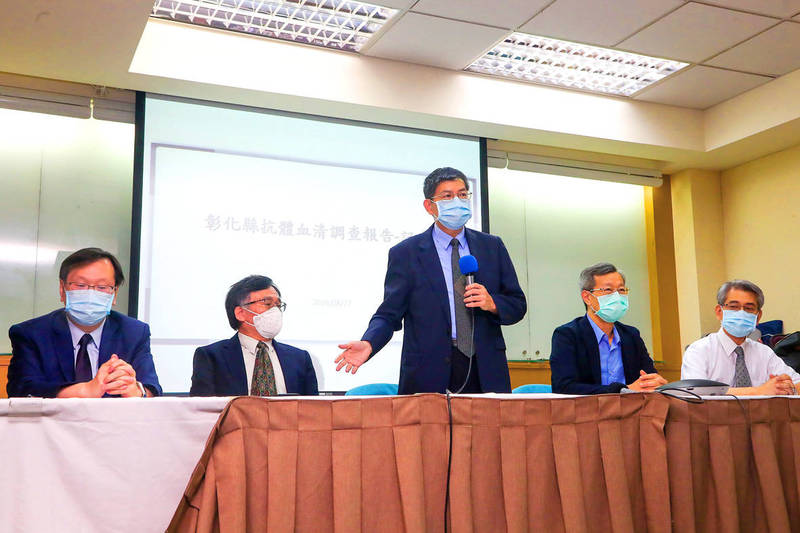《TAIPEI TIMES》 Changhua antibody study highlights success of CECC

From left, Centers for Disease Control Deputy Director-General Chuang Jen-hsiang, National Taiwan University College of Public Health former vice dean Tony Chen, former college dean Chan Chang-chuan, Changhua Public Health Bureau Director Yeh Yen-po and college dean Cheng Shou-hsia attend a news conference in Taipei yesterday. Photo: CNA
By Jake Chung / Staff writer, with CNA
The results of a controversial antibody study in Changhua County, which National Taiwan University (NTU) public health researchers announced yesterday, showed the success of the Central Epidemic Command Center’s (CECC) disease prevention efforts, but not the need for universal screening.
The research was mainly conducted by the county government, while NTU’s College of Public Health assisted with data analysis, former college dean Chan Chang-chuan (詹長權) told a news conference convened in Taipei to announce the preliminary results.
Chan had been calling for mass testing for COVID-19 to identify asymptomatic patients, but the CECC had not taken his advice.
Of the 4,841 high-risk people whose blood samples were analyzed, only four were confirmed positive, a rate of 8.3 positive people per 10,000, Changhua Public Health Bureau Director Yeh Yen-po (葉彥伯) said.
Those who were inspected included confirmed COVID-19 patients and those with high risk of becoming patients, including medical personnel, police officers who helped with disease prevention measures and those under home quarantine after returning from the US, Europe and China, he said.
The study demonstrates that the average citizen does not need an antibody test, Yeh said, adding that the test results prove that Changhua is safe.
Taiwan’s first COVID-19 patient, an unlicensed taxi driver who also became the nation’s first death from the pandemic, was in the county, but the rest of the nation does not need to worry now that Changhua is safe, he added.
Since April, the bureau has bumped heads with the CECC for conducting pathology testing not approved by the center.
An Aug. 15 test that discovered the nation’s 485th case — a Taiwanese teen living in the US who arrived on Aug. 5 for a family visit — was touted as proof that the nation needed to implement general screening for COVID-19, increasing tensions between the CECC and the county government.
At the news conference, Centers for Disease Control Deputy Director-General Chuang Jen-hsiang (莊人祥), the CECC’s spokesman, thanked the research team for announcing the results despite the challenges, saying that the research clarified whether the nation’s disease prevention system has any loopholes.
The results show that the CECC’s policy of using home quarantine and home isolation to prevent transmission of the virus by asymptomatic patients works, Chuang said.
Asked to comment on the results of the mass testing, Premier Su Tseng-chang (蘇貞昌) said it showed that the collaborative efforts of all parts of society to prevent the spread of the disease paid off.
It also showed that mass testing is unnecessary, he added.
Hopefully, people would learn their lesson and follow the CECC’s instructions, he said, adding that in disease prevention, unity is strength.
Regarding controversy surrounding the funding sources and testing agents for the research, Chan said that the school’s study was academic, as its contract with the county government said that it could provide assistance if public health evaluations were needed.
Their study had been approved by NTU’s Institutional Review Board, he added.
NTU provided the funding to purchase the antibody serum solutions and the research team helped analyze the serum samples, Chan said, adding that it did not collect any of the blood samples.
Additional reporting by Sean Lin, Wu Po-hsuan and Lin Hui-chin
新聞來源:TAIPEI TIMES



















